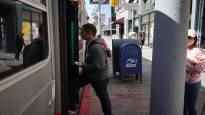After the visit to Europe, everyday attitudes in the United States seem stagnant, writes ‘s US journalist Yuri von Bonsdorff.
16.5. 14:11 • Updated May 16th. 15:58
WASHINGTON Life in the United States is usually interesting, but its attitudinal injuries are sometimes hard to bear.
I was reminded of this a couple of weeks ago when my family was on a holiday trip to London.
After living in the United States for almost fifteen years, my Americanized mind immediately turned its attention to London’s public transportation.
I admired the functionality of the subway and traditional red buses. There is not the slightest corner in the big city that cannot be reached smoothly and within a reasonable time. There is no need to wait for the trains, and even the buses rush to the stop.
People of all colors and ages were crammed into the wagons. The clothes were ragged to the chalkboard. The metro looked like a train for the whole nation, which has been invested in because it is important to people and society.
The situation in the United States is another. Here, public transport is a means of transport for minorities and the poor.
Even in the country’s capital, Washington, the subway isn’t comprehensive: it rarely runs, is late, and travels.
In the political debate, motorways are always a priority, although research shows that well-functioning public transport has a positive impact on people’s economic, social and health well-being.
I once interviewed a Democrat politician in Southern Virginia where I had traveled by bus. As a newcomer, I wanted to see the land from the bus window.
I don’t think your employer will appreciate you for putting on the bus, he said and laughed gruffly.
It wasn’t until later that I realized that public transportation was a loser’s means of transportation for him.
Another one I did in London the observation concerned a police officer whose activity we got to witness up close at a picnic in Hyde Park.
In the midst of a cheese sip, half a dozen constables rushed to the scene. They signaled a man with a backpack running through the grass field to stop. The brown man clearly had some suspicion.
My gaze was fixed on the empty hands of the police. There was no remote control or firearm in either hand because in Britain the police do not normally carry a gun.
For those accustomed to gun-fed American society, the observation was shocking.
In other words, in Hyde Park, the suspect did not have to fear being shot. In the United States, on the other hand, there are so many guns that you can watch out for them in the afternoon rush hour in Washington.
You never know what a co-driver who is raging in his car, he thinks is mistreated, will keep in his glove compartment.
After the picnic, we still laughed at the British comedian, who entertained the audience at the comedy club in Covent Garden with a staggering dose of self-irony.
Both the royals and the British colonial oppression and looting were picked up.
Here in the United States on their own the ugly songs in history are preferably kept quiet.
In school board meetings, parents threaten violence as schools seek to educate their students about racial discrimination.
In the United States, too, the honor of one’s own country should not be questioned, whether it is an athlete or a politician. Former star of American football, Colin Kaepernickwas smoked out of the sport when he criticized police.
President Barack Obama again, he was almost branded a traitor when he spoke openly about U.S. excesses during the Cold War.
In keeping with the worn cliché – sometimes you have to travel far to be able to see up close. After a visit to Europe, the United States feels stagnant and self-sufficient. Fortunately, however, that is not the whole truth about this country.
